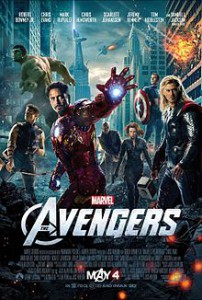Movie Review: Joss Whedon’s The Avengers

I loved The Avengers. I’ve seen it twice so far, and I have every intention of seeing it at least once more in theaters before buying it on DVD.
Every character was interesting and well used. The action was fun and made sense both visually and dramatically. The film was frequently hilarious, with better jokes and sharper physical comedy than most comedic films released every year. It was neither too campy nor too self-serious. It was expertly crafted by people who looked like they were having a fantastic time.
It helped that the movies leading up to it were also excellent. I’m a lifelong comic book fan and gave the Iron Man, Thor, and Captain America films my gold star of approval as well. (Iron Man 2 and The Incredible Hulk weren’t terrible, but they weren’t on the same level as the others.)
It also happens that I am a devoted fan of Joss Whedon, who wrote and directed The Avengers and created Buffy The Vampire Slayer, Angel, and Firefly, three of my favorite television shows of all time, as well as Dr. Horrible’s Sing-Along Blog, which is easily my favorite Internet movie musical about a singing supervillain.
It also just so happens that Joss Whedon is an award-winning humanist; he was awarded the Outstanding Lifetime Achievement Award from the Harvard Humanist Chaplaincy in 2009.
Whedon has been touching on religious issues for most of his career. In the first season of Buffy he caught some heat from the Religious Right for having Giles the watcher/librarian dismiss the Bible as false popular mythology. They never explained why vampires got burned when they touched a cross or got splashed with holy water. Hell was a literal place in the show’s canon, and between seasons 5 and 6 Buffy spent some time in heaven, which she described as a place without fear or pain. Later in Angel, the spinoff show about Buffy’s vampire boyfriend, we learned that there are powerful sentient celestial forces for good, but they had little to nothing in common with the God from the Bible and were exclusively referred to as The Powers That Be.
Which is not to say that Whedon is overtly hostile to religion or religious people. On the contrary, in Firefly one of the show’s most sympathetic (and mysterious) characters was a “Sheppard,” whom we can infer is a cross between a monk and a missionary. His character was a religious foil for the main protagonist, Malcolm Reynolds, who used to be a devout Christian until his faith was crushed along with the army he was a sergeant in.
In the Marvel comics universe, Thor and his family were all originally considered “Gods” but were later retroactively changed to, and portrayed in the movies as, powerful aliens along the same lines as Superman, with their home world of Asgard located on the other end of a wormhole.
In the six movies Marvel studios has produced, the biblical God has only been mentioned once, in The Avengers, in the following exchange:
SHIELD AGENT MARIA HILL
I wouldn’t get involved in this if I were you Capt’n. I mean, Thor is basically a god.
CAPTAIN AMERICA
There’s only one God ma’am, and I’m pretty sure he doesn’t dress like that.
That’s very in keeping with Captain America’s character. He’s a wholesome, home grown, lower middle class hero from the 1940s. Although he is never shown wearing a cross, going to church, or praying, it makes sense that, as a product of his time, he would take the existence of God for granted.
So does that mean that award-winning humanist Joss Whedon wrote and directed a non-humanist film?
The following is the conclusion of Whedon’s award speech at the Harvard Humanist Chaplaincy:
The enemy of humanism is not faith. The enemy of humanism is hate, is fear, is ignorance, is the darker part of man that is in every humanist, every person in the world. That is what we have to fight. Faith is something we have to embrace. Faith in god means believing absolutely in something with no proof whatsoever. Faith in humanity means believing absolutely in something with a huge amount of proof to the contrary. We are the true believers.
In that sense, The Avengers is very much a humanist film. And while Captain America has his old fashioned views on religion, the movie as a whole does not.
Loki, the movie’s villain, snake oil dripping out his pores, imagines himself to be a god in the old school biblical sense. He wants to subjugate humanity in worship of himself; and as a cruel, manipulative, narcissistic bully, is very much like the Yahweh who liked to mind control pharaohs and kill babies. Then Loki proceeds to gets his ass handed to him by everyone in the film, including, amazingly and hilariously, by The Incredible Hulk.
The Hulk, a scientist mutated through science into a “giant green rage monster,” represents the ultimate science experiment, who then smashes Loki’s face into the floor a bunch of times in quick succession, rolls his eyes, and calls him a “Puny god.”
You should go see The Avengers. Three or four times ought to be enough.
Steve Major is the development associate for the American Humanist Association.
